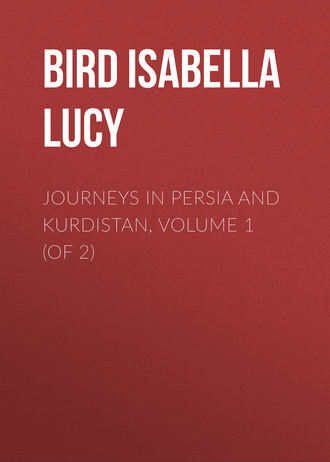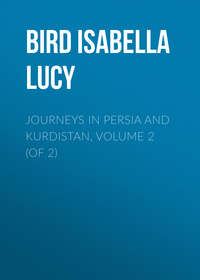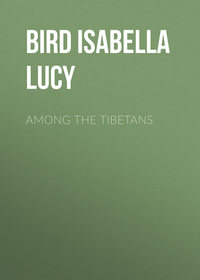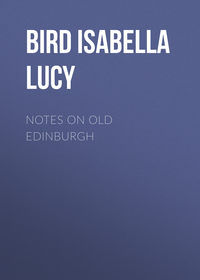 полная версия
полная версияJourneys in Persia and Kurdistan, Volume 1 (of 2)
29
An experiment I never regretted. Mirza Yusuf was with me for nine months, and I found him faithful, truthful, and trustworthy, very hard-working, minimising hardships and difficulties, always cheerful, and with an unruffled temper, his failings being those of a desk-bred man transplanted into a life of rough out-doorishness.
30
It is new to me, however, and may be new to a large proportion of the "untravelled many" for whom I write.
31
Major-General Sir R. Murdoch Smith, K.C.M.G., late Director of the Persian section of the Indo-European telegraph, read a very interesting paper upon it before the Royal Scottish Geographical Society on December 13, 1888, – a Sketch of the History of Telegraphic Communication between the United Kingdom and India.
32
I can imagine now what a hellish laugh that was with which "they laughed Him to scorn."
I was a month in Julfa, but never saw anything more of Isfahan, which is such a fanatical city that I believe even so lately as last year none of the ladies of the European community had visited it, except one or two disguised as Persian women.
33
Since my visit Mr. Preece, then, and for many previous years, the superintending electrician of this section of the Indo-European telegraph, has been appointed Consul, the increasing dimensions of English interests and the increasing number of resident British subjects rendering the creation of a Consulate at Isfahan a very desirable step.
34
A few weeks later she died, her life sacrificed, I think, to over-study of a difficult language, and the neglect of fresh air and exercise.
35
These sentences were written nearly a year ago, but many subsequent visits to missions have only confirmed my strong view of the very trying nature of at least the early period of a lady missionary's life in the East, and of the constant failure of health which it produces; of the great necessity there is for mission boards to lay down some general rules of hygiene, which shall include the duty of riding on horseback, for more rigorous requirements of vigorous physique in those sent out, and above all, that the natural characteristics of those who are chosen to be "epistles of Christ" in the East shall be such as will not only naturally and specially commend the Gospel, but will stand the wear and strain of difficult circumstances.
36
Nearly all my non-registered letters to England failed to reach their destination.
37
I have written nothing about this fast-increasing sect of the Bābis, partly because being a secret sect, I doubt whether the doctrines which are suffered to leak out form really any part of its esoteric teaching, and partly because those Europeans who have studied the Bābis most candidly are diametrically opposed in their views of their tenets and practice, some holding that their aspirations are after a purer life, while others, and I think a majority, believe that their teachings are subversive of morality and of the purity of domestic life.
38
Screw never became a friend or companion, scarcely a comrade, but showed plenty of pluck and endurance, climbed and descended horrible rock ladders over which a horse with a rider had never passed before, was steady in fords, and at the end of three and a half months of severe travelling and occasional scarcity of food was in better condition than when he left Julfa.
39
He has since been baptized, but for safety had to relinquish his business and go to India, where he is supporting himself, and his conduct is satisfactory.
40
I never returned, and only at the end of three and a half months emerged from the "Bakhtiari country" at Burujird after a journey of 700 miles.
41
Hadji Hussein deserves a passing recommendation. I fear that he is still increasing his fortune and has not retired. The journey was a very severe one, full of peril to his mules from robbers and dangerous roads, and not without risk to himself. With the exception of a few Orientalisms, which are hardly worth recalling, he was faithful and upright, made no attempt to overreach, kept to his bargain, was punctual and careful, and at Burujird we parted good friends. He was always most respectful to me, and I owe him gratitude for many kindnesses which increased my comfort. It is right to acknowledge that a part of the success of the journey was owing to the efficiency of the transport.
42
The writers who have dealt with some of the earlier portions of my route are as follows: Henry Blosse Lynch, Esq., Across Luristan to Ispahan – Proceedings of the R.G.S., September 1890. Colonel M. S. Bell, V.C., A Visit to the Karun River and Kûm – Blackwood's Magazine, April 1889. Colonel J. A. Bateman Champain, R.E., On the Various Means of Communication between Central Persia and the Sea – Proceedings of the R.G.S., March 1883. Colonel H. L. Wells, R.E., Surveying Tours in South-Western Persia – Proceedings of R.G.S., March 1883. Mr. Stack, Six Months in Persia, London, 1884. Mr. Mackenzie, Speech – Proceedings of R.G.S., March 1883. The following among other writers have dealt with the condition of the Bakhtiari and Feili Lurs, and with the geography of the region to the west and south-west of the continuation of the great Zagros chain, termed in these notes the "Outer" and "Inner" ranges of the Bakhtiari mountains, their routes touching those of the present writer at Khuramabad: Sir H. Rawlinson, Notes of a March from Zohab to Khuzistan in 1836 – Journal of the R.G.S., vol. ix., 1839. Sir A. H. Layard, Early Adventures in Persia, Susiana, and Babylonia, including a residence among the Bakhtiari and other wild tribes, 2 vols., London, 1887. Baron C. A. de Bode, Travels in Luristan and Arabistan, 2 vols., London, 1845. W. F. Ainsworth (Surgeon and Geologist to the Euphrates Expedition), The River Karun, London, 1890. General Schindler travelled over and described the Isfahan and Shuster route, and published a map of the country in 1884.
43
Among the trees and shrubs to be met with are an oak (Quercus ballota), which supplies the people with acorn flour, the Platanus and Tamariscus orientalis, the jujube tree, two species of elm, a dwarf tamarisk, poplar, four species of willow, the apple, pear, cherry, plum, walnut, gooseberry, almond, dogwood, hawthorn, ash, lilac, alder, Paliurus aculeatus, rose, bramble, honeysuckle, hop vine, grape vine, Clematis orientalis, Juniperus excelsa, and hornbeam.
44
In Persian haft is seven, and chakar four.
45
This computation is subject to correction. Various considerations dispose the Ilkhani and the other Khans to minimise or magnify the population. It has been stated at from 107,000 to 275,000 souls, and by a "high authority" to different persons as 107,000 and 211,000 souls!
46
Sir. H. Rawlinson sums up Bakhtiari character in these very severe words: "I believe them to be individually brave, but of a cruel and savage character; they pursue their blood-feuds with the most inveterate and exterminating spirit, and they consider no oath or obligation in any way binding when it interferes with their thirst for revenge; indeed, the dreadful stories of domestic tragedy that are related, in which whole families have fallen by each other's hands (a son, for instance, having slain his father to obtain the chiefship – another brother having avenged the murder, and so on, till only one individual was left), are enough to freeze the blood with horror.
"It is proverbial in Persia that the Bakhtiaris have been obliged to forego altogether the reading of the Fāhtihah or prayer for the dead, for otherwise they would have no other occupation. They are also most dexterous and notorious thieves. Altogether they may be considered the most wild and barbarous of all the inhabitants of Persia." – "Notes on a March from Zohab to Khuzistan," Journal of the R.G.S., vol. ix. Probably there is an improvement since this verdict was pronounced. At all events I am inclined to take a much more favourable view of the Bakhtiaris than has been given in the very interesting paper from which this quotation is made.
47
A report to the Foreign Office (No. 207) made by an officer who travelled from Khuramabad to Dizful in December 1890, contains the following remarks on this route.
"As to the danger to caravans in passing through these hills, I am inclined to believe that the Lurs are now content to abandon robbery with violence in favour of payments and contributions from timid traders and travellers. They hang upon the rear of a caravan; an accident, a fallen or strayed pack animal, or stragglers in difficulty bring them to the spot, and, on the pretence of assistance given, a demand is made for money, in lieu of which, on fear or hesitation being shown, they obtain such articles as they take a fancy to.
"The tribes through whose limits the road runs have annual allowances for protecting it, but it is a question whether these are regularly paid. It can hardly be expected that the same system of deferred and reduced payments, which unfortunately prevails in the Persian public service, should be accepted patiently by a starving people, who have long been given to predatory habits, and this may account for occasional disturbance. They probably find it difficult to understand why payment of taxes should be mercilessly exacted upon them, while their allowances remain unpaid. It is generally believed that they would take readily to work if fairly treated and honestly paid, and I was told that for the construction of the proposed cart-road there would be no difficulty in getting labourers from the neighbouring Lur tribes."
48
The readers interested in such matters will find much carefully-acquired information on water distribution, assessments, and tenure of land in the second volume of the late Mr. Stack's Six Months in Persia.
49
Some of the legends connected with these objects are grossly superstitious. At Shurishghan there is a "Holy Testament," regarding which the story runs that it was once stolen by the Lurs, who buried it under a tree by the bank of a stream. Long afterwards a man began to cut down the tree, but when the axe was laid to its root blood gushed forth. On searching for the cause of this miracle the Gospels were found uninjured beneath. It is believed that if any one were to take the Testament away it would return of its own accord. It has the reputation of working miracles of healing, and many resort to it either for themselves or for their sick friends, from Northern Persia and even from Shiraz, as well as from the vicinity, and vows are made before it. The gifts presented to it become the property of its owners.
50
And so it did, though it was then so ill that it seemed unlikely that it would live through the night, and I told them so before I gave the medicine, lest they should think that I had killed it.
51
Proceedings of R.G.S., vol. v. No. 3, New Series.
52
I am indebted for the information given above to a valuable paper by Mr. H. Blosse Lynch, given in the Proceedings of the R.G.S. for September 1890.




